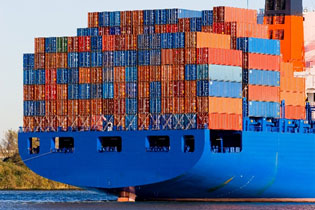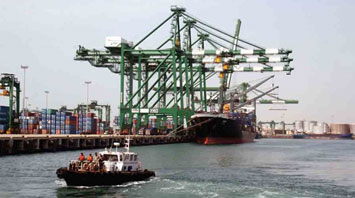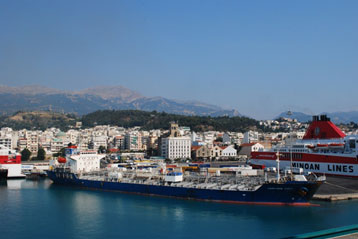|
|
 |
 |
| |
June Issue : June 2014 |
|
Christmas came and went. New Year hurtled in and now we are in June. Still not sure where February to April went. My fellow Board members
complained we hadnt done a newsletter this year so here it is. A few thoughts on investment returns, Greek fire, the Bay of Bengal
and the philosophy of experts and consultants. The letter closes out with a case study on a Public Private Partnership in Indonesia
that will help to explain why most of last year and the first few months of this year have been very busy for David Wignall Associates.
As always, it will be good to get your feedback on our opinions and comments in this newsletter, just contact me on on [email protected].
|

|
|
P3, G6, HPH, PSA and DP World, Port Authorities and the Disparity in Investment Return

An exam question for your Masters degree in port economics could be Compare and contrast the financial performance of the members of the P3 and G6 alliances
and other container shipping lines with those of the container terminals they use in ports across the world. An echo of this question came in the
closing session of the recent Terminal Operators Conference in Singapore. There the panel of experts (see later commentary), including my good self,
was asked, What will Container Terminals have to do to address the difference in performance between them and their users? The ever so polite and
implicit plea from the shipping lines being we lose money so why shouldnt you? This led to a lively debate but the truth is that though the container
shipping lines are the users and direct clients of the terminals they are not, most of the time, the decision makers behind calling at that port. The
decision makers in this instance are the shippers and they base their decisions on overall cost.
Note the careful use of words ports in one sentence and terminals in another. It is here perhaps the core of the answer to the Masters degree question posed. Terminals are often subject to relatively modest competition within a port. Terminal operators
take great pains to try and ensure that supply and demand for container handling in a port are in rough balance and will be maintained in rough balance
whenever possible. They have a need to ensure this because they are often investing heavily in the terminals that provide that capacity.
An interesting question arises though, is this management of demand really in the best interest of the economy of the host port or perhaps more appropriately
the host country (or put in a more geographically correct port hinterland)? Surely there is an argument that ensuring terminals compete and reduce
rates to the minimum they can offer is in the best interest of the economy. An example of this in action perhaps was Brisbane where they encouraged
the existing operators to add capacity and reorganize the operations prior to seeking bids for a third terminal.
There is a startling fact that the rates of return quoted as being required by container operators are 12% and more depending on the nature of risks they
perceive as being taken. However, when this is compared with the rates of return other investments offer at present in low single figures, it would
be easy to feel that the operators are being greedy. This view may be encouraged when you look at the amounts paid for large port assets by infrastructure
investors and their apparently low financial returns. The recent sale of a long term lease on Newcastle Port in New South Wales implied a multiple
of 27 on earnings; put it another way, it implied a far lower return on investment was being accepted by the purchaser. A landlord port is of course
not a direct comparison for a terminal operator but nevertheless it does provide an indicator for the sector.
Do the operators need to review their positions? Why should they when they are getting those high returns? Until the operators cannot deploy their capital
effectively into projects and gain these returns,one should predict that there will be no change. Further, with such a change, their shareholder would
have a right to complain about their managers. However, given the disparity in returns between carriers and terminals, between landlord ports and terminals,
and between terminals and other classes of assets surely some other thinking is required from Port Authorities on how to mobilize and finance their
ports for the benefit of the economy rather than the operators? For those interested in ideas please contact us for more details of ideas and thoughts.
|
Consultants and the Tyranny of Experts
 A few weeks ago Carolyn was lecturing at IPB (University of Bogor) and whilst taking a seminar she received something of a wake-up call. Seeking to learn more about the students, she was asking the bright young things what their plans were for the future. One of them, hopefully not being a sycophant, said she wanted to be like Carolyn; a training and Education Consultant. The students face fell when Carolyns reply to her follow-up question, What advice can you give me? was, Go and get 20 years of experience in education covering as many aspects of the subject as practical. A few weeks ago Carolyn was lecturing at IPB (University of Bogor) and whilst taking a seminar she received something of a wake-up call. Seeking to learn more about the students, she was asking the bright young things what their plans were for the future. One of them, hopefully not being a sycophant, said she wanted to be like Carolyn; a training and Education Consultant. The students face fell when Carolyns reply to her follow-up question, What advice can you give me? was, Go and get 20 years of experience in education covering as many aspects of the subject as practical.
In this is encapsulated one of our key problems: that people wish to give advice without having the experience and understanding to make that advice worthy of being given. Two other examples have struck home harmonizing with this theme in recent days. The Tyranny of Experts: Economists, Dictators and the Forgotten Rights of the Poor a new book in which William Easterly rails against the western view of development being imposed on the developing world and my daughters university dissertation on irrigation and trade in Indonesia which shows fairly conclusively that Dutch expertise drove Indonesia down the wrong path in the 1870s through reliance on experts who actually had no relevant experience. Indonesia and particularly Java was on the verge of Industrial take off in a very similar position to Japan immediately prior to the Meiji Restoration. Oh how the world would be different if an industrial revolution had occurred then in Indonesia! To clash with these views it was interesting to read the views of Mochtar Riady (Lippo), billionaire investor, whose published view on his success recently (The Sunday Times, 4th May 2014) was to choose experts and then rely on them. As my granddad used to say you pay your money and you take your chances.
|
Bay of Bengal, Regional Review

Over the last few months we have been examining the ports and terminals around the Bay of Bengal and found some interesting things. First, a surprising
lack of competition in the container shipping sector. Too many slot charters and slot exchange deals to foster real competition. The total volumes
here of course are an important element in reducing the potential for competition but nevertheless it was a shock to understand how consolidated you
can make these services look depending on the vantage point taken.
Second, the impact of bigger ships may have a curious side effect; the rich get richer and the poor get left behind. Large ships are helpful
to generate large volumes of containers and have the potential to reduce transport costs. However, if you cannot fill enough of those ships your port
is pushed back toward hub and spoke style operations and potentially higher transport costs for your containers. One of the key benefits of container
terminal developments for the economy can be direct calls. But the experience of Laem Chabang, one of the more successful transshipment ports, is that
larger ships lead to a reduction in direct calls. One application of this impact may be in understanding the role of the recently opened port expansion
in Colombo, the outer harbour development. A big miss from Indias perspective has been the failure of most Indian ports, excepting JNPT, to attract
direct calls. The trend to bigger ships combined with the availability of more capacity (and more capable capacity) in Colombo may make attracting
such calls even harder and make the development of Indias Cabotage trade even less likely.
Connected to the direct calls and coastal container distribution in India, a third interesting subject to have come out of the Bay of Bengal work is the
long distances between container terminals on the west coast of India. The distances are far larger than on a not too different coast in terms of population;
China. Why this is and how to resolve it is something we are working on further!
Semi-connected to the second and third points, in our next newsletter I hope to have a look at the three most obvious ports where floating container terminals
may be the best or indeed only solution should the port and in effect the state or region wish to try and deal with their container connectivity issues:
Chittagong (Bangladesh), Kolkata/Haldiia (West Bengal) and Thilawa/Yangon (Myanmar).
|
Greek Port Privatization

For those of you paying attention the last couple of weeks has been an interesting time in Greek Port Privatization. When is a shortlist
not a shortlist? When the newspaper say it is a shortlist and the bidders tell you they merely expressed interest! The shortlist
of bidders for Piraeus Port was announced by the Hellenic Republic Asset Development Fund (HRADF) according to several new agencies
and more discretely other decisions were taken that taken together make it less likely that that open bidding will be the main process
through which Greek Ports are turned into cash by the Greek Government. Something of a surprise when the success of bid processes in
Australia are considered.
|
|
First, that shortlist: APM Terminals BV, Cosco (Hong Kong) Group Ltd, Cartesian Capital Group LLC, International Container Terminal Services
Inc, Ports America Group Holdings, and Utilico Emerging Markets Ltd. The interesting thing about these is Cosco Pacific already operates two-thirds
of the Piraeus container terminal through a 35-year concession agreement it signed in 2008; what for the interest of ICTSI, Ports America and APMT
one therefore asks (I have and therefore have doubts they will really bid!). This, COSCO being eliminated on conflict of interest or competition concerns,
leaves only two viable bidders: a private equity firm and an infrastructure fund. HRADF therefore seem left without much of a position to engender
competition. That is surprising given the potential quality of the asset; making a market in the port sector may be harder than it looks..
The less heralded decisions relate to the smaller ports in Greece where though there are good niche opportunities available and little appetite for open
competitive process seems to exist. Shame as we see that Crete and Volos in particular offer great potential, done right.The Greek Government can ring
me anytime!
Container Terminal 1, New Priok Port: A Case Study

By the grace of God in this year of 2014 a miracle has been achieved in that a world class Public Private Partnership has been completed
in the port sector in Indonesia. On April 19th 2014, Mitsui and Indonesia Port Corporation (IPC) signed a Shareholders Agreement to
invest in the development and operation of Container Terminal 1 in New Priok Port (the first of three terminals in the first phase
of the port expansion). The agreement signed was the keystone of the development of the US$ 2.5 billion New Priok and secured the future
of Tanjung Priok in Container Handling for the next twenty years. Hopefully this is enough time to allow Chilamaya, the 100 year port
for Jakarta, to be designed and developed.
The process for New Priok Port to succeed has involved application of the basic principles of PPP. First, it ensured that there was a clear, legally certain regulatory position for the development. Though initially awarded by Presidential Decree to IPC,
after award a clear world class Concession Agreement was negotiated between IPC(a state-owned enterprise operating on a commercial
basis) and the Tanjung Priok Port Authority(an agency of the Ministry of Transportation). This provided definitive terms for the development
in respect of concession fees, termination events, termination payments etc... Thus a firm foundation on which to base the construction,
operational and financial aspects of the development was created.
With the foundation in place IPC then established a legal structure through which construction risk, financial risk, market risk and operating
risk could be clearly allocated to those parties best able to manage those risks. In doing so they created a situation where the return
on investment made in infrastructure could be realized by IPC whilst transferring the market risk to the operator. This was then done
through a transparent operator bid process. At the same time IPC ensured that the operators knew they had a fair chance of securing
the contract to operate based on clear pre-defined qualification and assessment criteria. The scrutiny of the bid process by a fiercely
independent oversight panel gave IPC and Consultants alike a high incentive to ensure the process was clean and transparent; they had
nowhere to hide and so could hide nothing.
Container Terminal 1 is not the end of the story but hopefully a new beginning. If other State Owned Enterprises and Regulators in Indonesia
study the development maybe they can emulate the success. IPC will continue the process and secure the development of Container Terminals
2 and 3 in New Priok as well as other specialist terminal within the new development. There is also the intention to use the expertise
gained to accelerate port development across Indonesia.
David Wignall Associates has been instrumental in the development of New Priok Port and is looking to use the experienced gained on other
projects in Indonesia. We also hope to provide a detailed case study at a conference near you soon!
|
|
|
|
|
|
|
|
|
|
|